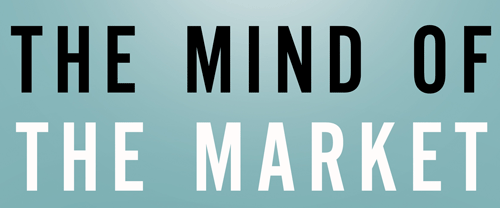The Mind of the Market: Reviews

Endorsements
Economists who understand Charles Darwin are almost as rare as biologists who understand Adam Smith. Yet the two were essentially saying the same thing — that order emerges unordained from competition and innovation. Michael Shermer brilliantly brings the two insights together to explain how the human mind creates the human market.
Economics is not just about money. It is also about human nature, justice, trust, and happiness. Michael Shermer brilliantly shows that the real experts of Homo economicus are often found in psychology, biology, even primatology.
Written with his customary verve and flair, The Mind of the Market is Michael Shermer at his best. Roving over the entire sweep of history, and drawing on the best of modern science, Shermer attempts a grand synthesis of research from psychology and the neurosciences to demonstrate that markets are moral and that free trade meshes well with human nature. Shermer entertains as well as informs, and in the process he deepens the argument for economic, political and social freedom.
Reviews
LA Times (January 25, 2008)
Man’s True Nature Meets Market Economics (by Lee Drutman)
Back in the 17th and 18th centuries, philosophers typically began political treatises with an exploration into the “state of nature,” the premise being that the ideal form of governance should follow logically from mankind’s true condition. But what is mankind’s true nature? Good or bad? Thomas Hobbes took a famously dour view: Life is “solitary, poor, nasty, brutish, and short,” at least without the rule of a Leviathan. Jean-Jacques Rousseau, however, justified direct democracy by claiming that man is naturally compassionate, “born free, and everywhere he is in chains.” … Read the full review
Washington Post (January 24, 2008)
For Sale: Big Ideas About Humanity (by Tyler Cowen)
Have you ever wondered how people develop trust and live together peacefully? Michael Shermer’s new book uses psychology and evolution to examine the root of these human achievements. He notes that the original environment in which people evolved, namely the small groups in hunter-gatherer societies, helped people develop altruism and cooperative behavior.
At the same time, our biological heritage drives human discontent. Our evolution on the East African plains did not equip us to cope emotionally with the large-scale and often impersonal nature of a modern market society. Small tribal groups are used to sharing, not to extremes of wealth. That is why envy is rife. In other words, he says, you may feel that modern capitalism is unfair if you apply the outmoded moral code of the tribe. Shermer believes we nonetheless should look to the market as the dominant mode of organizing social affairs… Read the full review
New York Post (December 30, 2007)
Monkey, Business: For a Better Economy,
We Need to Fight Our Better Instincts (by Nicole Gelinas)
The theme of Michael Shermer’s new book is a graceful paradox. Decades of study of behavioral psychology, neuroscience and genetics, layered over more than a century of evolutionary studies, proves that we’re not completely rational in making economic choices. But an understanding of our fascinating limitations, which Shermer provides, makes us freer than we were before we knew of them… Read the full review
Publishers Weekly (November 5, 2007)
Shermer provides an in-depth examination of evolutionary economics. Using fascinating examples — from monkeys that balk at unfair distributions of rewards after completing a task to humans who feel cheated when offered $10 of free money if a partner is given $90 — Shermer explores the evolutionary roots of our sense of fairness and justice, and shows how this rationale extends to the market. Drawing upon his expertise as a scientist and the works of noted economists, Shermer argues convincingly that human beings are not exclusively self-centered, the market itself is moral, and modern economies are founded on our virtuous nature. He explores how we mind our money, the value of virtue, why money can’t buy happiness and whether we are really free to make choices. Though dense in places, this book offers much insight into human behavior and rationales regarding money and fairness and will be of interst to serious readers of science or business.
Kirkus Review (October 15, 2007)
Shermer applies his knowledge of evolutionary science to the volatile topic of modern economics.
The founder and editor of Skeptic magazine does a bang-up job knitting together the complexities of science and the frail psychology of human beings to explain the unpredictable postmodern world of trade and finance. Pledging that economics is for everyone, the author offers a forbidding, textbook definition of evolutionary economics, then adds, “this is a swanky way of saying that the economy is a very complex system that changed and adapted to circumstances as it evolved out of a much simpler system.” Exploring the transition from a hunter-gatherer economy to one based on consumer trade, Shermer argues that the world economy not only has a mind of its own but is also constantly shifting due to the influence of the consumers, traders and organizations that participate in it. Far from being needlessly complicated, the book tackles a host of psychological, scientific and ethical quandaries with clear-eyed panache, making its case with evidence not just from usual suspects like Adam Smith and Ayn Rand but also from the evolutionary science of Steven Jay Gould and the Western films of John Ford. Like any good teacher, Shermer grounds his lessons in real-world examples, some drawn from his personal experience as a marathon bicycle racer, some from the global marketplace and others lifted from scientific studies far outside the public domain. Later chapters like “The Value of Virtue” and “Don’t Be Evil” skew a bit idealistically in considering the ethics of the post-Enron business clime. But overall, Shermer’s argument that “we must study the laws of human behavior in economics as the physicist, chemist, or biologist studies the laws of nature” is persuasive.
An informative, inventive, broad-spectrum analysis of what makes modern man tick, starting with his wallet.

